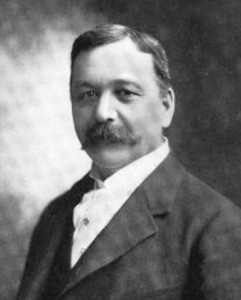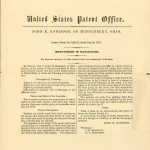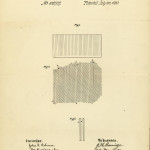
Posted in Akron History, Barberton History, Barberton Rail, People
John Kelly Robinson was a central figure in early Barberton History. He was a key investor in its creation and development, but Robinson’s influence reached far beyond the Magic City.
From Telegrapher to Tycoon
John Kelly Robinson was born on May 26, 1842, in Springfield, Ohio near Akron (Middlebury). He was the son of John Carter and Margaret Maria (Kelly) Robinson. Through his mother, Robinson was related to Col. John Kelly, a famous soldier of the Indian wars and the American Revolution.
After attending the public common and high schools of Akron, Ohio, J.K. Robinson earned $5.00 a month working as a clerk in the Akron book store owned by his brother, Wilson G. Robinson. While there, Robinson studied telegraphy under William C. Allen and served as a telegraph operator for about two years.
In September of 1862, Robinson briefly took part in the Defense of Cincinnati from Major General Kirby Smith and his confederate rebels. That same year he began to sell matches for one of the smallest match manufacturers in the country, George and O.C. Barber’s Barber Match Company.
Initially, Robinson sold matches from a wagon to storekeepers and anyone else interested in the necessities of the day. By making use of the rapidly expanding rail network, he began to expand the range of his sales territory. Within two years, Robinson had become such a successful salesman that he was admitted to partnership in the Company.
Barber Family Ties
Robinson was married, in 1869, to Henrietta Eleanor Barber, daughter of George and Eliza (Smith) Barber, the founder of the Barber Match Company. They would go on to have four daughters: Margaret Elizabeth, Mary Frances, Laura Barber and Eleanor, and one son, John K. Robinson, Jr.
The Diamond Match Patent
In 1871, while working for the Barber’s, Robinson obtained a patent for the process of manufacturing a diamond-shaped match. The diamond shaped matches created a strong quick flame and became a very popular, thus giving the Barber Match Co. the market place advantage they needed to grow. The Diamond Match Company, successor to the Barber Match Company, would take its name from Robinson’s match.
- John Kelly Robinson
- Robinson match patent page 1
- Robinson match patent page 2
- John Kelly Robinson
Robinson remained in control of the Barber sales department. In 1880 the Barber factories, once among the smallest producers of matches, were producing more than one-fourth of all matches sold in the United States. Robinson was promoted to president of the company. Then in 1881 when it was merged into the Diamond Match Company, he was elected as a director.
Robinson took charge of sales in the Western states, and soon afterwards of all sales in the United States and its territories. In 1890 he was named Treasurer of the Company.
Founder, Investor, Executive
Mr. J.K. Robinson was an initial investor in the Barberton Land and Improvement Company the founders of Barberton, Ohio. He also served in executive roles for:
- Barber Match Co.
- Diamond Match Co.
- Sterling Boiler Co.
- Diamond Rubber Co.
- Barberton & Western Railroad
- Barberton Belt Line Railroad
- Wabash Paper Co.
- Barberton Savings Bank
Robinson was the organizer of the Carrara Paint Company and the Tropical Fibre Co., which produced fiber from palmetto trees.
Politics, Service and High Society
Robinson was a steadfast Republican. During the Civil war he served in the Ohio Home Guards, that, under General Lew Wallace, prepared to capture John Hunt Morgan. Mr. Robinson was a member of the Washington Park Club, the Calumet Club, the Essex (Mass) Club and several golf clubs.




